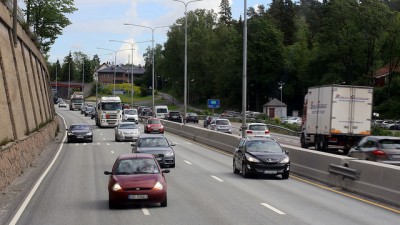The three leaders of Oslo’s new city government immediately set off widespread confusion when they unveiled their political platform on Monday. The Greens’ ever-smiling Lan Marie Nguyen Berg was triumphant after pushing through plans to close downtown Oslo to private cars by 2020 and halt expansion of the overburdened E18 highway west of Oslo, but few understood how or even whether that can happen.

Some Members of Parliament were already summoning Oslo’s new left-wing government coalition leader, Raymond Johansen of the Labour Party, to Parliament to explain his coalition’s intentions. Signals were so mixed after Monday’s press conference that politicians on both the left and right were uncertain what the city’s new leaders really think they can do.
One thing was clear: It will more than likely become much for difficult and even more expensive to drive into or even through Oslo. Years of tolls on vehicles, meant to discourage driving, haven’t sufficiently reduced traffic to satisfy the admittedly “radical” leaders of the new left-wing city government. They are thus resorting to more draconian measures to force people out of their cars and onto public transportation.
‘Driving will become like smoking’
The Greens’ Berg likened driving a car to smoking, predicting it will come to be viewed as just as “strange” and be as restricted as smoking is now. She was met by smiles from her far more experienced colleagues, political veterans Johansen and Marianne Borgen of the Socialist Left party (SV).
Among the more concrete proposals to reduce the number of cars in Oslo by 30 percent were additional tolls on rush-hour driving, a network of entirely car-free streets in the inner city, further reduction of parking spots and removal of those that conflict with 60 new kilometers of bicycle lanes that will be put in place. A new fund that will subsidize purchase of electric bicycles will also be introduced. The minority coalition needs the support of the far-left Reds party, but it also favours a car-free downtown, so such measures are likely to be approved.

‘War over E18’
The new coalition also bannered zero expansion of the E18 highway’s capacity but that’s more complicated to achieve. Funding and planning around that highway involve both the Conservatives-led governments in suburban Akershus County plus the Conservatives-led state government. So even though Borgen joined Berg in declaring “there will no expansion of E18,” they immediately met political roadblocks.
Hårek Elvenes, a Member of Parliament and leader of the Conservatives in Akershus, called Oslo’s new plan “a declaration of war over a new E18.” He told Norwegian Broadcasting (NRK) that it also defied all the negotiations that have gone on for years over E18, and it defied the intentions of the state politicians who have said they will fund it. Officials at the state highway department, Statens vegvesen, meanwhile, said they will continue to plan for an E18 expansion and indicated it didn’t much matter what the new Oslo city politicians think. Their boss is state Transport Minister Ketil Solvik-Olsen and the E18 is a national highway, so the state has overall authority. Solvik-Olsen calls the E18 project “a cooperation between Akershus, Oslo and the state. Oslo can’t be a show-stopper.” He said the state highway department can continue the work it’s been doing.
“There is now full confusion about what this new city government in Oslo really means about the E18,” Linda Hofstad Helleland of the Conservatives, an MP who leads the Parliament’s transport committee, told NRK. “We won’t accept any further delays in the E18 expansion plan. We will invite Raymond Johansen to Parliament to explain himself.”
Berg, Borgen and Johansen all kept smiling, calling their new government coalition and its policies both “radical” and “historic.” Berg declared it really would usher in the much-hyped “green shift” and that she was “very proud” over the parties’ platform, which also includes pulling all the city’s investments out of fossil fuels and adding “environmental” lanes (presumably for electric cars) to the existing E18, E6 and Ring 3 highways in and around Oslo, in addition to special lanes reserved for public transport. That would further squeeze out conventional cars that run on gasoline or diesel.
The three also promised that Oslo would become a “better city for children and the elderly,” with day care centers for 3,000 more children, more teachers and more elder care workers. Much of that will be paid for through a new allegedly “moderate” property tax on homes and businesses.
newsinenglish.no/Nina Berglund

